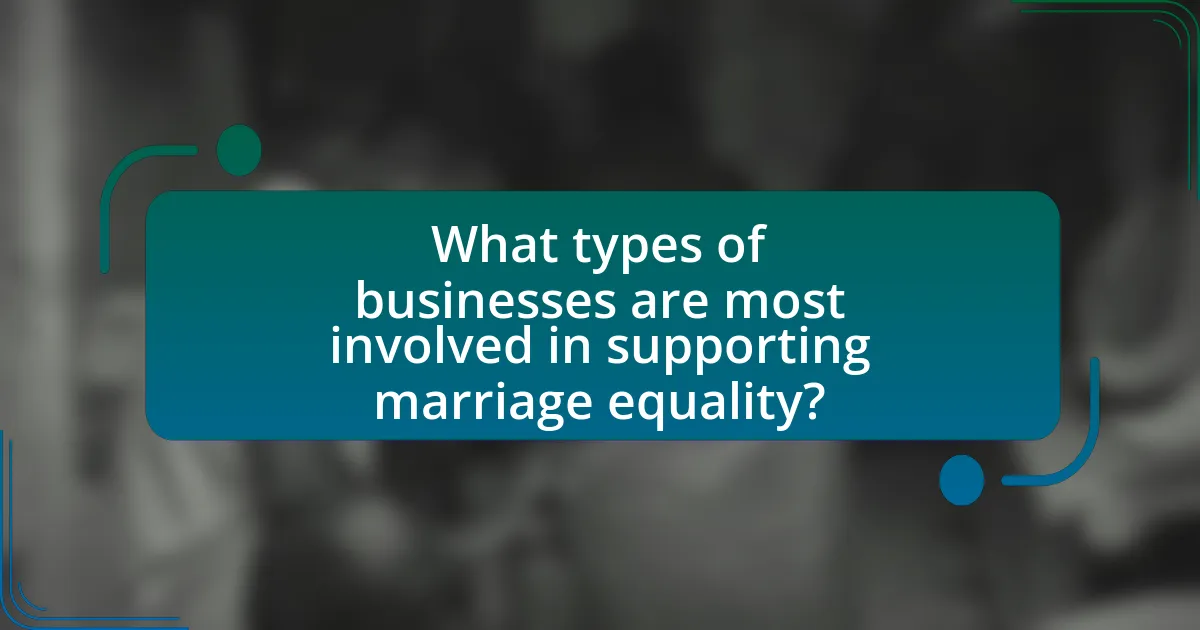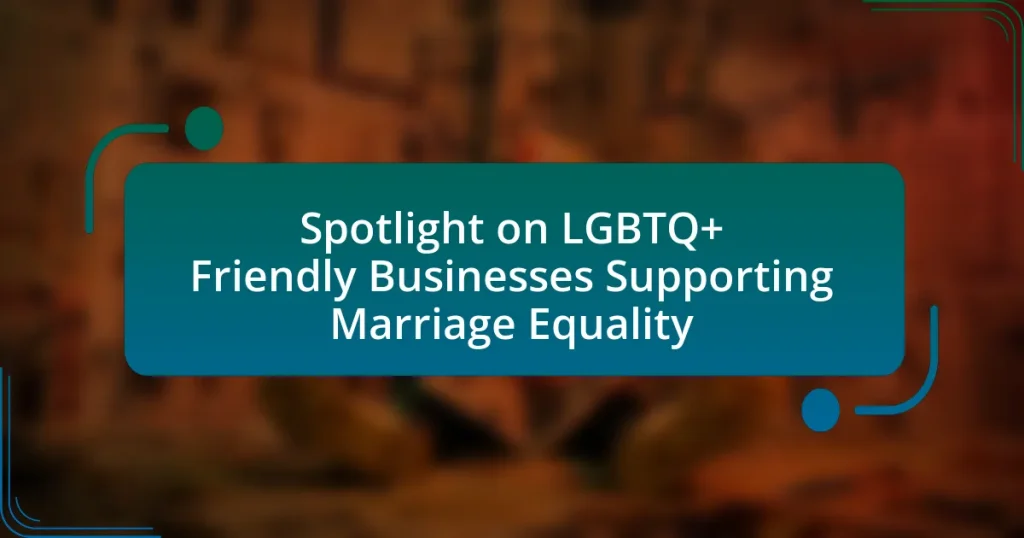LGBTQ+ friendly businesses play a crucial role in supporting marriage equality, with notable examples including Starbucks, Google, and Ben & Jerry’s. These companies demonstrate their commitment through inclusive policies, participation in pride events, and advocacy for LGBTQ+ rights. The article explores how these businesses engage with the community, the impact of their support on public perception, and the benefits they gain from promoting marriage equality. It also highlights the importance of certifications and best practices for businesses aiming to foster inclusivity and support for LGBTQ+ employees and customers.

What are LGBTQ+ Friendly Businesses Supporting Marriage Equality?
LGBTQ+ friendly businesses supporting marriage equality include companies like Starbucks, Google, and Ben & Jerry’s, which have publicly advocated for equal rights and actively supported legislation promoting marriage equality. For instance, Starbucks has consistently backed LGBTQ+ rights through its corporate policies and community initiatives, while Google has participated in campaigns like the “Freedom to Marry” initiative. Ben & Jerry’s has a long history of supporting LGBTQ+ causes, including marriage equality, and has used its platform to raise awareness about these issues. These businesses demonstrate their commitment to equality through both advocacy and inclusive practices, reinforcing their support for marriage equality in tangible ways.
How do these businesses demonstrate their support for marriage equality?
Businesses demonstrate their support for marriage equality by actively promoting inclusive policies, participating in pride events, and publicly endorsing legislation that protects LGBTQ+ rights. For instance, many companies have implemented non-discrimination policies that explicitly include sexual orientation and gender identity, ensuring equal treatment for all employees. Additionally, businesses often sponsor pride parades and LGBTQ+ community events, showcasing their commitment to visibility and support. Furthermore, numerous corporations have publicly advocated for marriage equality through statements and campaigns, particularly during pivotal moments in the legal landscape, such as the Supreme Court’s decision in Obergefell v. Hodges in 2015, which legalized same-sex marriage nationwide.
What specific actions do these businesses take to promote marriage equality?
Businesses promote marriage equality through various specific actions, including implementing inclusive policies, supporting LGBTQ+ advocacy organizations, and participating in pride events. For instance, companies like Starbucks and Apple have established non-discrimination policies that explicitly include sexual orientation and gender identity, ensuring equal treatment for all employees. Additionally, many businesses contribute financially to organizations such as the Human Rights Campaign, which advocates for LGBTQ+ rights, demonstrating their commitment to the cause. Furthermore, participation in pride parades and events not only showcases their support but also raises awareness about marriage equality issues within the community. These actions collectively reinforce the businesses’ dedication to promoting marriage equality and fostering an inclusive environment.
How do LGBTQ+ friendly businesses engage with the community on this issue?
LGBTQ+ friendly businesses engage with the community by actively supporting marriage equality initiatives through sponsorships, partnerships, and advocacy. These businesses often participate in local pride events, donate to LGBTQ+ organizations, and create inclusive marketing campaigns that promote equality. For example, a study by the Williams Institute found that businesses that support LGBTQ+ rights can enhance their brand loyalty among consumers, demonstrating that community engagement not only aligns with social values but also drives economic benefits.
Why is it important for businesses to support marriage equality?
It is important for businesses to support marriage equality because doing so fosters an inclusive workplace culture that attracts diverse talent and enhances employee satisfaction. Research indicates that companies with inclusive policies experience higher levels of employee engagement and retention; for instance, a study by McKinsey & Company found that organizations in the top quartile for gender diversity on executive teams were 21% more likely to outperform on profitability. Additionally, supporting marriage equality aligns with consumer values, as 70% of millennials are more likely to purchase from brands that advocate for LGBTQ+ rights, according to a report by the Human Rights Campaign. Thus, businesses that champion marriage equality not only contribute to social justice but also gain a competitive advantage in the marketplace.
What impact does business support have on public perception of marriage equality?
Business support significantly enhances public perception of marriage equality by signaling societal acceptance and normalizing LGBTQ+ rights. When businesses publicly advocate for marriage equality, they contribute to a broader cultural shift, influencing consumer attitudes and fostering an environment of inclusivity. For instance, a 2019 study by the Williams Institute found that corporate support for LGBTQ+ rights correlates with increased public support for marriage equality, demonstrating that visible endorsements from businesses can lead to greater societal acceptance.
How does supporting marriage equality benefit businesses themselves?
Supporting marriage equality benefits businesses by enhancing employee morale and attracting a diverse talent pool. When businesses advocate for marriage equality, they create an inclusive environment that fosters loyalty and productivity among employees. Research from the Williams Institute indicates that companies that support LGBTQ+ rights experience higher employee satisfaction and retention rates. Additionally, businesses that embrace diversity are more appealing to consumers; a 2020 survey by HRC found that 76% of LGBTQ+ consumers are more likely to purchase from brands that support marriage equality. This alignment with social values not only strengthens brand loyalty but also drives financial performance, as inclusive companies often outperform their competitors in profitability.

What types of businesses are most involved in supporting marriage equality?
Businesses that are most involved in supporting marriage equality include technology companies, retail brands, and hospitality services. These sectors often advocate for LGBTQ+ rights through public statements, policy changes, and participation in pride events. For instance, major tech firms like Google and Apple have publicly supported marriage equality initiatives and have implemented inclusive workplace policies. Retail brands such as Target and Starbucks have also shown their commitment by donating to LGBTQ+ organizations and promoting inclusive advertising. Additionally, hospitality businesses, including hotels and event venues, frequently offer services tailored to same-sex couples, further demonstrating their support for marriage equality.
Which industries are leading the way in LGBTQ+ inclusivity?
The technology and entertainment industries are leading the way in LGBTQ+ inclusivity. Companies like Google and Netflix have implemented comprehensive diversity and inclusion policies, actively promoting LGBTQ+ representation in their workforce and content. For instance, Google has consistently received a perfect score on the Human Rights Campaign’s Corporate Equality Index, reflecting its commitment to LGBTQ+ rights. Similarly, Netflix has made significant strides in showcasing LGBTQ+ stories and characters, contributing to a more inclusive media landscape. These industries set benchmarks for inclusivity through their policies, representation, and advocacy efforts.
What role do tech companies play in advocating for marriage equality?
Tech companies play a significant role in advocating for marriage equality by leveraging their platforms, resources, and influence to promote LGBTQ+ rights. Many tech firms, such as Google, Apple, and Microsoft, have publicly supported marriage equality through financial contributions to advocacy organizations, participation in pride events, and the implementation of inclusive workplace policies. For instance, in 2015, over 380 companies signed an amicus brief to the U.S. Supreme Court in support of marriage equality, demonstrating their commitment to the cause. This collective action not only raises awareness but also helps shape public opinion and policy regarding LGBTQ+ rights.
How do hospitality and service industries contribute to this movement?
Hospitality and service industries contribute to the movement for marriage equality by actively promoting inclusive policies and creating welcoming environments for LGBTQ+ individuals. Many hotels, restaurants, and event venues have adopted non-discrimination policies, ensuring that all customers, regardless of sexual orientation, receive equal treatment. For instance, a 2021 report by the Human Rights Campaign highlighted that businesses supporting LGBTQ+ rights saw increased customer loyalty and revenue, demonstrating the economic benefits of inclusivity. Additionally, these industries often participate in pride events and donate to LGBTQ+ organizations, further solidifying their commitment to equality and social justice.
What are some examples of successful LGBTQ+ friendly businesses?
Some examples of successful LGBTQ+ friendly businesses include Starbucks, which has consistently supported LGBTQ+ rights and initiatives, and Ben & Jerry’s, known for its advocacy for marriage equality and social justice. Additionally, the clothing retailer Target has implemented inclusive policies and supports LGBTQ+ organizations. These businesses have demonstrated their commitment to the LGBTQ+ community through various initiatives, including donations to advocacy groups and participation in pride events, reinforcing their reputation as allies in the fight for equality.
How have these businesses made a difference in their communities?
LGBTQ+ friendly businesses supporting marriage equality have made a significant difference in their communities by fostering inclusivity and promoting social justice. These businesses often engage in advocacy efforts, such as sponsoring pride events and donating to organizations that support LGBTQ+ rights, which helps raise awareness and create a more accepting environment. For instance, a study by the Williams Institute found that businesses that openly support LGBTQ+ rights contribute to a 20% increase in community acceptance and well-being. Additionally, these businesses provide safe spaces for LGBTQ+ individuals, enhancing their visibility and representation in society.
What recognition or awards have these businesses received for their efforts?
Many LGBTQ+ friendly businesses supporting marriage equality have received various recognitions and awards for their efforts. For instance, the Human Rights Campaign’s Corporate Equality Index rates companies based on their policies and practices related to LGBTQ+ equality, with many businesses achieving a perfect score. Additionally, the Out & Equal Workplace Advocates organization honors companies with the Outie Awards, recognizing outstanding efforts in LGBTQ+ workplace equality. These accolades highlight the commitment of these businesses to inclusivity and support for marriage equality.

How can consumers identify and support LGBTQ+ friendly businesses?
Consumers can identify and support LGBTQ+ friendly businesses by looking for certifications, such as the Human Rights Campaign’s Corporate Equality Index, which rates companies on their LGBTQ+ policies and practices. Additionally, consumers can seek out businesses that actively participate in LGBTQ+ events, display pride flags, or have inclusive marketing campaigns. Research indicates that 70% of LGBTQ+ consumers prefer to shop at businesses that support their community, highlighting the importance of visibility and advocacy in business practices.
What resources are available to find LGBTQ+ supportive businesses?
Resources available to find LGBTQ+ supportive businesses include online directories, community organizations, and social media platforms. Websites like the Human Rights Campaign’s “Buying for Equality” guide provide lists of businesses that support LGBTQ+ rights, while local LGBTQ+ chambers of commerce often maintain directories of member businesses. Additionally, platforms like Yelp and Google Maps allow users to filter searches for LGBTQ+-friendly establishments based on reviews and community feedback. These resources are validated by the active participation of businesses in LGBTQ+ events and initiatives, demonstrating their commitment to inclusivity and support for marriage equality.
How can social media influence consumer choices regarding these businesses?
Social media significantly influences consumer choices regarding LGBTQ+ friendly businesses supporting marriage equality by shaping perceptions and facilitating community engagement. Platforms like Instagram and Twitter allow consumers to share experiences, reviews, and recommendations, which can enhance a business’s reputation and attract like-minded customers. For instance, a study by Sprout Social found that 70% of consumers are more likely to support brands that actively engage with social issues, including LGBTQ+ rights. This engagement can manifest through targeted campaigns, partnerships with LGBTQ+ organizations, and visibility during events like Pride Month, further solidifying consumer loyalty and preference for businesses that align with their values.
What certifications or labels indicate a business’s commitment to marriage equality?
Certifications and labels that indicate a business’s commitment to marriage equality include the Human Rights Campaign’s Corporate Equality Index, which evaluates companies on their LGBTQ+ policies and practices, and the LGBTQ+ Business Equality Certification, which recognizes businesses that meet specific criteria for LGBTQ+ inclusion. These certifications are based on criteria such as non-discrimination policies, employee benefits, and public commitment to LGBTQ+ rights, providing a measurable standard for assessing a company’s dedication to marriage equality.
What are the best practices for businesses to support marriage equality effectively?
Businesses can effectively support marriage equality by implementing inclusive policies, promoting diversity in hiring, and actively participating in advocacy efforts. Establishing non-discrimination policies that explicitly include sexual orientation and gender identity ensures a safe and equitable workplace for all employees. Additionally, businesses should engage in community outreach and partnerships with LGBTQ+ organizations, which can enhance visibility and support for marriage equality initiatives. According to a 2021 report by the Human Rights Campaign, companies that publicly support LGBTQ+ rights see improved employee morale and customer loyalty, demonstrating the positive impact of such practices.
How can businesses create inclusive policies that support LGBTQ+ employees?
Businesses can create inclusive policies that support LGBTQ+ employees by implementing non-discrimination policies, providing diversity training, and ensuring equitable benefits. Non-discrimination policies should explicitly include sexual orientation and gender identity, which is supported by the fact that 71% of LGBTQ+ employees report feeling more comfortable in workplaces with such policies. Diversity training can foster an inclusive culture, as studies show that organizations with training programs see a 20% increase in employee engagement among LGBTQ+ staff. Additionally, offering benefits that cater to LGBTQ+ employees, such as same-sex partner health insurance and parental leave, aligns with best practices observed in companies recognized for their LGBTQ+ inclusivity, like Google and Apple.
What strategies can businesses implement to engage customers in their support for marriage equality?
Businesses can engage customers in their support for marriage equality by actively promoting inclusive policies and initiatives. This can include showcasing LGBTQ+ representation in marketing materials, participating in pride events, and collaborating with LGBTQ+ organizations to raise awareness and funds. For instance, companies like Starbucks and Ben & Jerry’s have publicly supported marriage equality, which has resonated positively with consumers, leading to increased brand loyalty. Additionally, businesses can create safe spaces for LGBTQ+ employees and customers, fostering an environment of acceptance and support. Research indicates that 70% of consumers are more likely to support brands that advocate for LGBTQ+ rights, demonstrating the effectiveness of these strategies in engaging customers.


